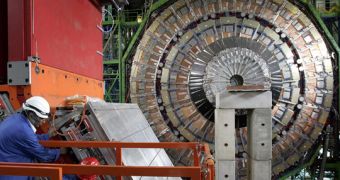As explained in a recent article, the Large Hadron Collider's latest malfunction was due to the leaking of a major quantity of helium from the superconducting solenoid magnet caused by the melting of an electrical connection because of the high voltage involved. Now, scientists found out that it happened as a result of a poor soldering work at just one out of 10.000 electrical connections. This may well prevent the experiment from happening for an even longer period than expected.
As you surely know already, the LHC is designed in order to mimic at a very small scale the processes that took place during the matter cooling in the trillionth of a second following the Big Bang by smashing protons with hydrogen atoms' nuclei in conditions of high energy. The hole created by the electrical glitch allowed for the spilling of about a ton of helium which was used to cool the respective section to extreme temperatures. Latest assessments of the damage pushed the date of the experiment even further, with April next year only seeing the restoration of electricity within the device in order to reach full power in May 2009.
Although numerically 1 in 10.000 is not much, when it comes to this sort of device magnitudes, it can mean everything. As Lyn Evans, the project leader for the European Nuclear Research Organization's Large Hadron Collider, says, “it costs dearly”. This second, even bigger delay, together with repair costs, maintaining the implicated adjacent devices in function and people involved still focused will send the project costs sky-high, while not providing any result for quite some time. Besides that, it will also cause worldwide opinion and trust to lower even more. They were already at a low record before the last mishap that followed the first major success, some people going as far as proclaiming that LHC means the end of the world and perhaps of the whole universe, and dragging CERN into court over this presumption.

 14 DAY TRIAL //
14 DAY TRIAL //